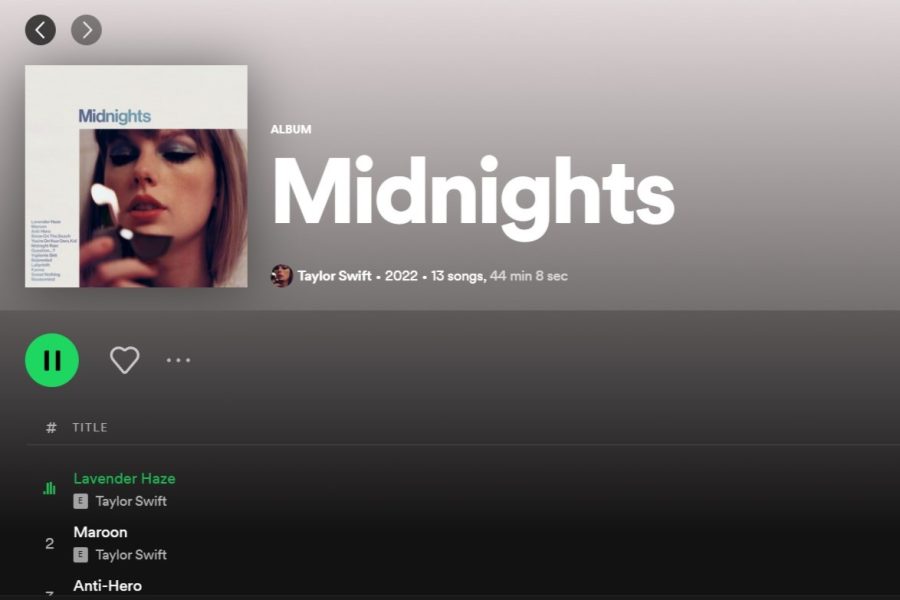Op-Ed: Taylor Swift’s “Midnights” album could have waited until morning
A screenshot of Taylor Swift’s new album “Midnights” playing on Spotify, a popular music streaming platform. “Midnights” was released on Spotify and other platforms on Oct. 21, 2022.
November 8, 2022
Popular singer-songwriter Taylor Swift released her highly-anticipated studio album “Midnights” on Oct. 21. “Midnights” is Swift’s 10th album so far, apart from two re-recordings.
Featuring 13 tracks, or more accurately “13 sleepless nights,” Swift’s newest album showcases aggressively synth-pop numbers, many of them describing how Swift’s experiences with the music industry have impacted her internal monologue.
Swift has successfully written in variations of genres such as pop, country, folk, indie and rock, but this album takes a different turn. Drawing the most similarities from her previous “Lover” and “1989” albums, “Midnights” maintains a darker atmosphere with its use of heavy reverb and lower melodies.
Additionally, Swift and her team decided to skip the customary release of singles before dropping the full album and instead shared a series of short form videos announcing the title of each track. The series was called “Midnights Mayhem With Me.”
The first episode premiered Sept. 21. In these episodes, Swift randomly selected a song from the album using a spinning ball cage like the ones used traditionally for bingo games. She then revealed the track title and a short, vague description of its theme.
This unusual promotion method was bound to leave some fans with mixed feelings when the album released because they naturally developed different expectations for the sound of each track — expectations that may not have aligned with the final product of the album — based on Swift’s descriptions in her promotional series.
“Midnights” begins with the track “Lavender Haze” in which Swift describes her love with long time partner Joe Alwyn as a protection from the scrutiny of the outside world.
“They’re bringing up my history, but you weren’t even listening” Swift writes.
This lyric explains how Alwyn avoids feeding into the media’s perception of their relationship and Swift herself. “Lavender Haze” is one of the most airy songs on the album with relatively simple lyricism and a singable melody. This introduction piece will likely be heard repeatedly on the radio in upcoming months.
In stark contrast to “Lavender Haze”, track two, “Maroon” tells the story of a past relationship and evokes a darker and more desolate tone. The beat here is more rhythmic, with drum sounds highlighted, yet the lyrics follow at a constant, slow rate.
Swift recounts how this past love was not what she believed it to be.
“Carnations you had thought were roses, that’s us,” Swift sings.
“Maroon” upholds the aesthetic of the album and allows listeners to pick up on autumn vibes and the expected gloom that usually follows a breakup.
It is after “Maroon,” that Swift’s album begins to lose its lyrical appeal and aesthetic uniformity, calling into question whether this new Swift era should be here to stay.
The album’s third song, “Anti-Hero” was the first to have a music video, which was released alongside the full album on Oct. 21.
In the video, Swift is taunted by a much larger, clumsier version of herself who makes many mistakes and has only negative things to say. The lyrics here are lacking, to say the least, painfully bouncing between clever and childish throughout the song.
For example, Swift goes from singing, “I have this thing where I get older but just never wiser” to “It’s me, hi, I’m the problem, it’s me.” The latter has been trending on TikTok with numerous creators using the line in a comedic fashion.
Typically, an introspective take like “Anti-Hero” would be considered admirable coming from a celebrity like Swift. But, with such poor wording, it is difficult to be impressed. These almost talked phrases draw similarity to the song “Me!” from Swift’s 2019 album “Lover,” which also faced criticism in the lyrical department.
The remaining ten tracks on Swift’s latest album follow a similar pattern, with a few upbeat songs like “Bejeweled” and “Karma” being obviously written for radio play. A limited selection of deep, dark tunes dispersed throughout the album actually fit the cover aesthetic and are saved by choice phrases that pull them a step above skippable.
Electro-pop beats like “Midnight Rain” which are scattered throughout the 13 track album may leave listeners wondering whether Swift should have stuck with her country era.







